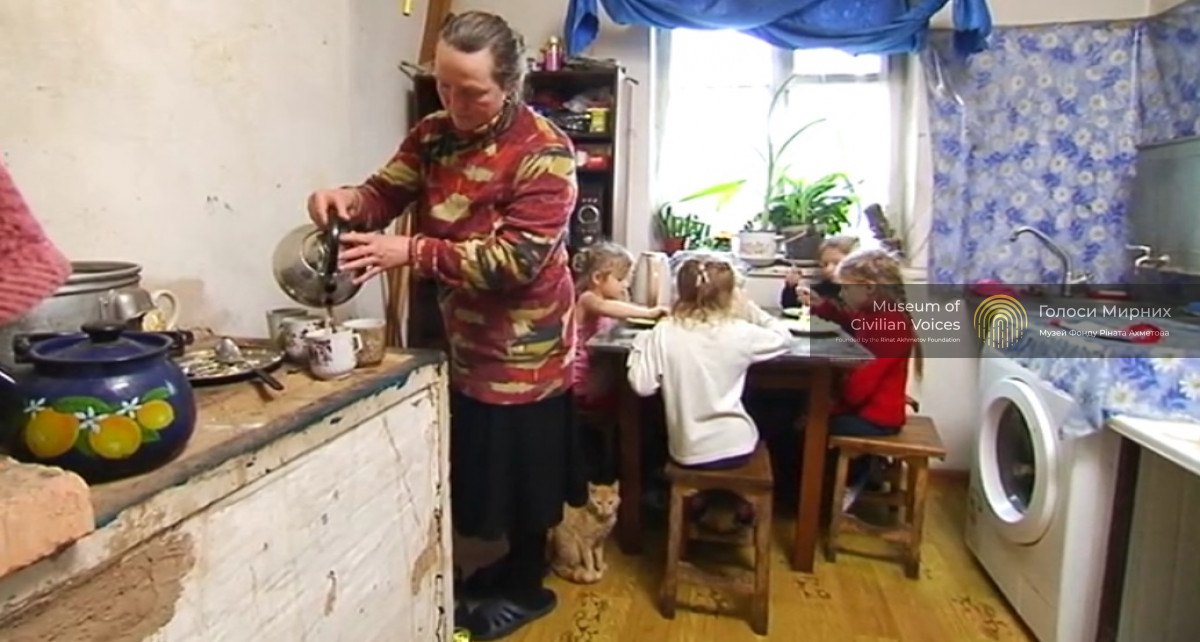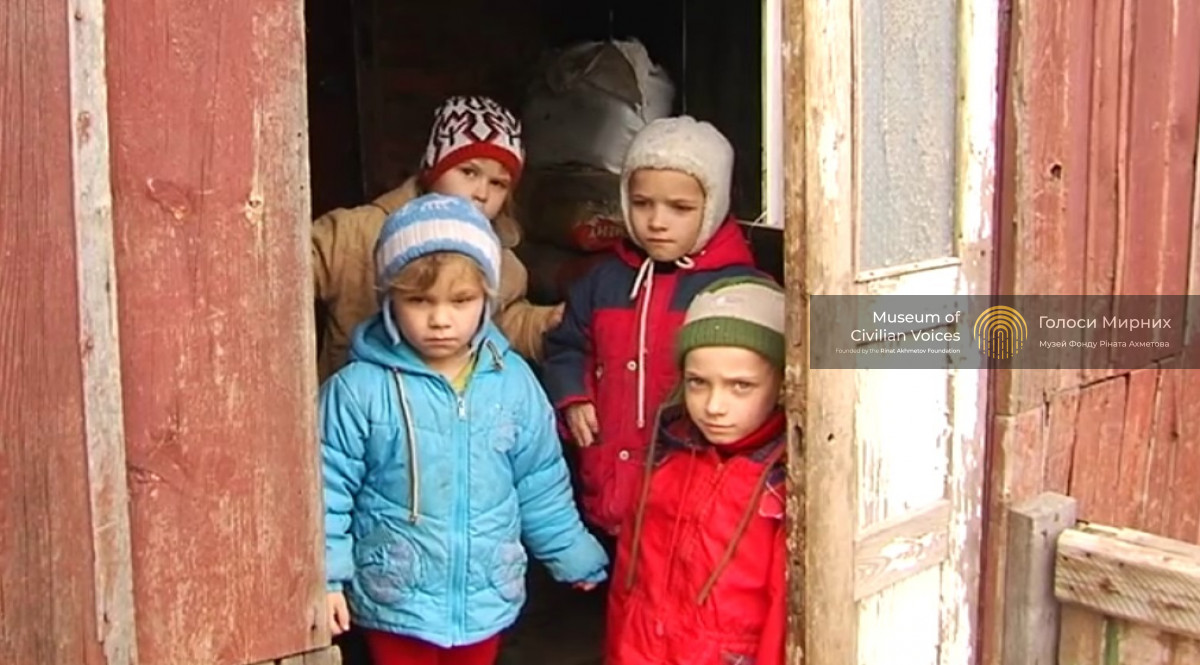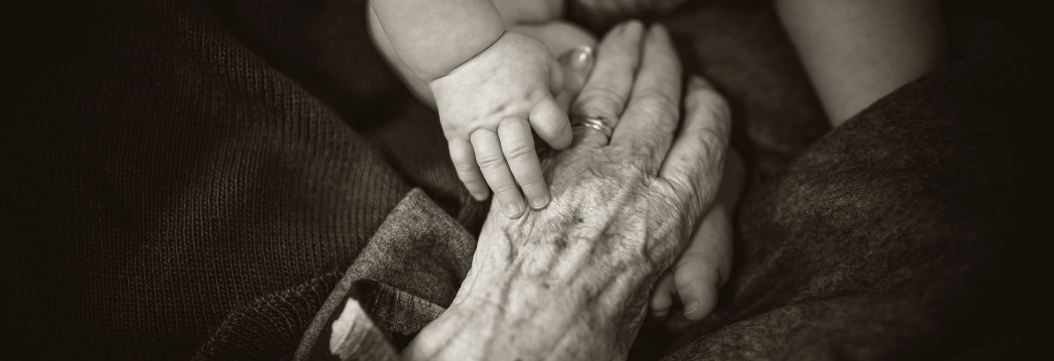The large Dzhanibekovs family raised 14 adopted children. Before the war, they adopted four kids and moved into a new house. They just finished the refurbishment when shelling began. The children cannot go to school, they have nowhere to play. The parents try to deflect their attention from the roar of artillery guns with fairy tales.
If peace could come now, we don’t need anything else... We will do everything ourselves; we just need peace.
I began to adopt children when I was 26 years old. My husband and I have 14 children. Ten of them are grown up children, and the latest ones, the youngest ones were adopted right before the war. We adopted three kids in August and we adopted Nadiyka in December. Soon after that Maidan started and then the war began shortly.
The children have grown up and there is still some strength. Why shouldn’t we make a family for some more kids? After all, the time is very difficult. When my mother left the orphanage, they were provided with housing and everything else. Now children go out after orphanages and there is nothing. Our elder children stay in touch with us, we already have 12 grandchildren.

Every individual has the right for life and every child has the right to have a mother or a father. I never selected children. I adopted those that were shown to me.
Almost all of my elder children had some issues. There was almost not a single healthy kid. Either a kid infected with tuberculosis or a kid with rachitis, or psoriasis, or enuresis. Every kid had something. I raised a boy who is a disabled person. He has a knee that starts from his hip. One leg is half shorter than the other one. He is 26 years old now, but he was a lying case back then. Now he has a family, he has a daughter. Otherwise, he would be doomed to stay at the centre for disabled people life-long.
When I adopted a daughter, we were told that she was like a plant, that she would not be developing, that she had a dying brain, that she would neither walk nor speak. She communicates well. In our family we do not feel that she has any special issues. She is a normal, ordinary kid. She understands everything, can ask anything and does everything. Sometimes it happens that she can become a little bit nervous due to her temper and as a result of her illness. You would need to find an approach towards her, so that she calms down, and that’s it.
When the war began, it was very difficult. We just moved into a house that we bought just before the war. And the only thing that we managed to do was to lay on water supply. And we did not manage to do the repairs. Then there was no electricity supply for months and shells were landing here close by.
The blockade began. It was very difficult because I didn’t apply for my pension. I also couldn’t apply for the children’s social payments because for this I had to bring the children to the [government-controlled] territory of Ukraine.
It would take a day or even two to do it. And how can I leave such children unattended, especially at such a time?
People helped us as much as they could. We harvested what we could in the vegetable garden. I am very thankful to Horlivka rehabilitation centre that helped me a lot. We visited this centre. And of course, many thanks to the Rinat Akhmetov Foundation. I was getting their help. It meant a lot to us. In fact, we survived due to this help. And not only us. So many retirees, lonely people.
I think that Donbass survived... This aid was provided just in time. Thanks to Rinat Akhmetov. He is not the only businessman in our country, but no one extended a helping hand to our people at such a difficult moment. And this man did not turn away, did not refuse. People survived thanks to this aid.
We wanted to have our own livestock and to be closer to nature. We liked the area here, which is very nice. We bought this house. It was not like that before the war, surely. There was no power supply for months. Here everything burst from the explosions. And the house is warm and nice. It is big and there is enough space for the children. We planted the garden, it is growing, everything has been put to order. The only thing is that we need peace.
Our children are not scared. First, we told them that it was a thunderstorm, that it was raining somewhere. When they began to more or less understand that this was not a thunderstorm, we explained to them that there was a war going on, there was shellfire. Well, it was either thanks to us or they just got used to it and so they do not take it all sharply. Only if [the shelling] is somewhere very close, they get scared. Usually, the shellfire begins after six o’clock.
We live an ordinary life, feed our children and play with them. When heavy shelling rages, Nadiyka gets more scared, so I sleep with her. And the rest of the kids are fine. During heavy shelling we sit down all together and try to tell them some fairy tales, some rhymes. We are trying to take their minds off it.
Where can we hide? Let’s say in the cellar, but where is the guarantee that there will be no direct hit to this cellar? No cellar will save you from this. That is why what’s the point in going down to the cellar? You don’t know where it [a shell] will land. That is why we do not hide in the cellar.

We started the first form of school and studied for a week. Then the children went to school for their first lesson and the school came under shellfire. Children were evacuated through the windows and then were taken home – and our studies ended. That is why, we are without school. We hope that maybe, God willing, the war will end. Three kids need to go to school.
All the children are waiting for peace, waiting for summer, so that they could go somewhere freely. Now you can’t go anywhere freely, neither to nature, nor to the forest. We used to have a forest meadow, a lawn where we would come for rest. They remember that. And now you won’t go to that lawn.
If peace could come now, we don’t need anything else... We will do everything ourselves; we just need peace.
When quoting a story, a reference to the source – the Museum of Civilian Voices of the Rinat Akhmetov Foundation – is mandatory, as follows:
The Museum of Civilian Voices of the Rinat Akhmetov Foundation https://civilvoicesmuseum.org/


